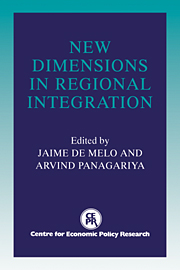Book contents
- Frontmatter
- Contents
- List of figures
- List of tables
- Preface
- Foreword
- Acknowledgements
- List of conference participants
- PART ONE SYSTEMIC ISSUES
- PART TWO COUNTRY ISSUES
- 6 The new regionalism: a country perspective
- Discussion
- 7 The European Community: a case of successful integration?
- Discussion
- 8 Regional integration in Sub-Saharan Africa: past experience and future prospects
- Discussion
- 9 Latin America's integration and the multilateral trading system
- Discussion
- 10 Regional integration in Eastern Europe: prospects for integration within the region and with the European Community
- Discussion
- 11 Regional trade arrangements in North America: CUSTA and NAFTA
- Discussion
- 12 Trading blocs and East Asia
- Discussion
- 13 Prospects for regional integration in the Middle East
- Discussion
- Round Table Discussion
- Index
Discussion
Published online by Cambridge University Press: 04 May 2010
- Frontmatter
- Contents
- List of figures
- List of tables
- Preface
- Foreword
- Acknowledgements
- List of conference participants
- PART ONE SYSTEMIC ISSUES
- PART TWO COUNTRY ISSUES
- 6 The new regionalism: a country perspective
- Discussion
- 7 The European Community: a case of successful integration?
- Discussion
- 8 Regional integration in Sub-Saharan Africa: past experience and future prospects
- Discussion
- 9 Latin America's integration and the multilateral trading system
- Discussion
- 10 Regional integration in Eastern Europe: prospects for integration within the region and with the European Community
- Discussion
- 11 Regional trade arrangements in North America: CUSTA and NAFTA
- Discussion
- 12 Trading blocs and East Asia
- Discussion
- 13 Prospects for regional integration in the Middle East
- Discussion
- Round Table Discussion
- Index
Summary
Will regional integration (RI) agreements in Latin America promote economic progress among these countries? This question can be split into two parts. Will agreements lead to meaningful economic integration among members, in the sense that market forces will be allowed greater scope: clearly signing agreements does not imply implementation of the envisaged steps. Secondly, if the steps are implemented, what will be the effects on economic progress? Some very tentative remarks on these questions will be offered below. I find myself generally in agreement with Nogues and Quintanilla's policy recommendations in Chapter 9, both with respect to market-friendly development policy and with respect to regional versus unilateral trade reform initiatives. By framing the issues in an explicitly political and strategic context, I intend to add some support to their policy recommendations. Prior to that, it will be useful to make some observations about the reasons for the shift in attitudes toward the market in Latin America and about the importance of trade and trade policy for economic growth.
The East Asian experience
The Latin American shift in attitude toward market-oriented development and particularly toward outward-looking trade policies has probably been strongly influenced by the success of the East Asian ‘Gang of Four’ and the striking contrast of their experiences with that of most of Latin America. There has been a debate about the sources of East Asian success, with a neoclassical interpretation of Balassa, Krueger, Little, and others emphasising the role of market forces, and a revisionist interpretation of Jones and Sakong, Pack and Westphal, Amsden, and Wade emphasising departures from the market (see Wade, 1990, for a list of sources).
- Type
- Chapter
- Information
- New Dimensions in Regional Integration , pp. 313 - 318Publisher: Cambridge University PressPrint publication year: 1993

